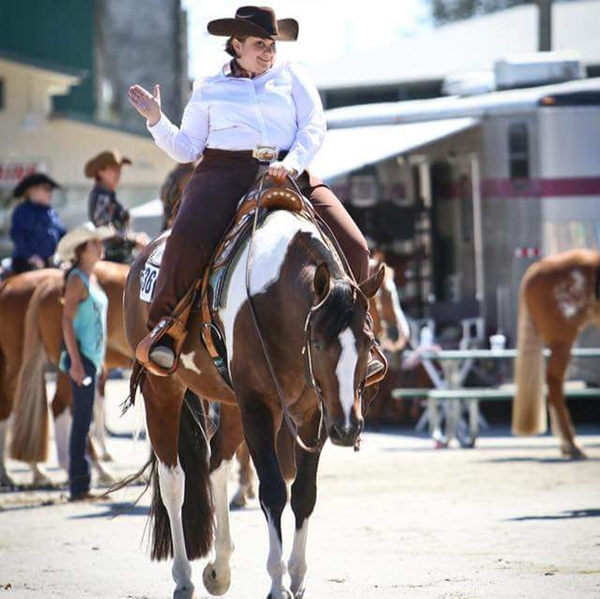Taking Personal Ownership of Your Show Ring Success… and Failure
Exhibitors of all ages have a responsibility to themselves and the training program that they are a part of. Your responsibility is very simple: be self-aware and take ownership of, and for yourself. If you can master these responsibilities, you will have a much more productive and successful time in all aspects of the horse show industry.
Have you ever thought about your individual horse show success and really reflected upon the steps, strategies, or work that led to those successes and/or failures in the show pen? Are you thinking about your personal goals as you reflect and actively problem solving how to advance yourself positively toward those goals? Are you willing to take ownership of the actions that may have contributed toward the success of your goals, and/or any negative growth toward your goals?
I’m asking these questions of you, as I have asked them of myself on more than one occasion. Things don’t always go as planned after the gate closes, and there are many different reasons why that happens. The manner in which you handle your individual disappointments, or successes, is my point.
In most training programs, the number of clients is greater than the trainers. That means a certain level of independence is required from everyone in order to keep things moving along smoothly. It also means that the processes and procedures in place within your particular training program need to be followed.
I have recently been talking with different trainers all over the country regarding their systems for communicating behavioral expectations to their clients. I admit, that when I first started to seek out this information, I didn’t expect any of them to be so forthcoming. I also had no idea how many trainers have thought out, organized, and specifically communicated expectations for client behavior.
 Each training program is a triangle, with each point of the triangle being interdependent upon the other points. The top of every triangle is you, the client. To the left of you, is your trainer, who is working alongside and in coordination with you. To the right are your mutual goals, and or learning plan, that your trainer has specially crafted in collaboration with you and with your personal goals in mind. Each point of your personal triangle is important and connected to the points both before and after it. You could also chose to look at your triangle as sections that lead to the top point, which again, is you, but either way, everything within or around your triangle is joined.
Each training program is a triangle, with each point of the triangle being interdependent upon the other points. The top of every triangle is you, the client. To the left of you, is your trainer, who is working alongside and in coordination with you. To the right are your mutual goals, and or learning plan, that your trainer has specially crafted in collaboration with you and with your personal goals in mind. Each point of your personal triangle is important and connected to the points both before and after it. You could also chose to look at your triangle as sections that lead to the top point, which again, is you, but either way, everything within or around your triangle is joined.
When you step back and consider yourself within this framework, it becomes easier to see a few very simple truths.
1. Your trainer is working with you and your horse, so that you can achieve mutual goals and show upward growth.
2. Your level of work, preparedness, and engagement is directly related to your final outcome.
3. You are accountable to yourself, your trainer, your horse, and the work you have been doing to prepare for the event, just as your trainer is accountable to you for preparing your horse.
4. Just because you’re working hard, that doesn’t guarantee a win.
5. Within your personal triangle, no one person is fully responsible, because your entire team is interconnected. No one point of your triangle is at fault, nor is it appropriate to place blame on any one point.
Now that you understand my triangle metaphor, you can then focus inwardly and reflect upon your behavior. I don’t mean behavior, in terms of tantrums or rudeness, but rather in terms of how you look at the things going on around you and respond to them. For example, what type of personal energy are you bringing to your show team? Have you worked in collaboration with your trainer prior to the show? Are you prepared, as much as you can be, to ride the classes in which you are entered? Are you willing to accept disappointment if things don’t go as you planned? Are you willing to accept mutual responsibility if you become disappointed? In short, are you prepared to engage in positive sportsmanship like behavior even when you don’t want to?
This can be a tough pill to swallow. I completely understand and can empathize with everyone on this one, but when you look at this from the perspective of your triangle being your team, all of a sudden it is much easier. Being a positive member of a team means that you have the support of others who are invested in you and care about your growth. Being part of a team means that you’re not alone. It means that your successes and failures are shared, so you don’t have to shoulder anything completely alone.
My fellow exhibitors, I ask you to routinely engage in self-reflection. I think you will be happier for it in the long run. I ask you to step back and consider your triangle. Finally, I ask you to own what you bring to the table.
Respectfully Yours
~Kory Kumar
Have a suggestion for Kory for a future blog topic? Email B.Bevis@EquineChronicle.com.












